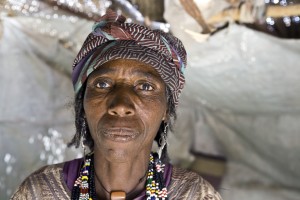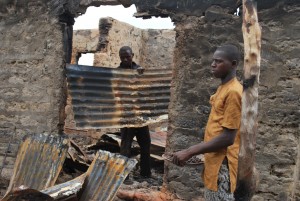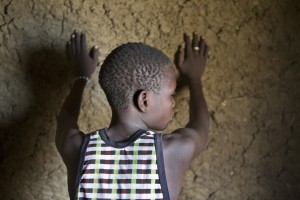Fighting statelessness in Benin: birth certificates are distributed in the disputed area of Kourou-Koualou
“I will now be able to go to school! I hope one day to become a teacher”
NATITINGOU, BENIN, 25 February 2016 – Juliette, 10, proudly shows off the birth certificate that she received from the President of the Natitingou Tribunal, a city located about 700 kilometers from Cotonou, the capital of Benin. “I will now be able to go to school! I hope one day to become a teacher”, explains Juliette.
John also just received this valuable document. “It’s the first time in my life that I receive an identification document. Now, I know that I exist”, says the fifteen-year-old boy, who recently took part in a ceremony where birth certificates were distributed to populations at risk of statelessness in the north of Benin.
John was born in Kourou-Koualou, an area in the north of the country that is contested by Burkina Faso and Benin. The two governments called upon the International Court of Justice to resolve the border dispute in 2009 but in the meantime, many people, including children, do not have nationality documents and are at risk of statelessness.
“In Benin, statelessness is especially a problem in the border areas”, explains Pépin Glele, UNHCR’s Head of Office in Benin. “There are populations that live in remote parts of the country, beyond the reach of the State, where there is no mechanism to register people and distribute birth certificates. These people are confronted with serious identity problems, as they do not have papers and often cannot regularize their status before the local courts because it costs too much”.
In order to resolve the situation and respect the commitments from the regional conference on statelessness, which took place in Abidjan, Côte d’Ivoire, in February 2015, the Government of Benin has adopted a national action plan to eradicate this scourge. With UNHCR’s support, around 1730 birth certificates have been distributed since December 2015 to inhabitants of this disputed area. Over a thousand were given to children.
“We are very grateful for UNHCR’s support, which has enabled us to give out these crucial documents to the children”, declared Jean-Pierre Yerima, the President of the Natitingou Tribunal. “They now exist and will no longer have to suffer the consequences of not having a nationality, which would prevent them from going to school or accessing basic social services. Thanks to this work, the children will be connected to a country and enjoy the rights associated with having a nationality”.
Thousands of people remain without documentation in this disputed area and are, as a result, at risk of statelessness. “This is why it is crucial to reinforce birth registration in the border areas” says Pépin Glele. Other territorial conflicts, such as between Benin, Togo and Nigeria, were resolved with the creation of mixed commissions by these States. “It is important that measures are taken to resolve these situations because otherwise, they can quickly lead to statelessness”, warns Pépin Glele.

John lives with his parents in Kourou-Koualou, an area that is contested by Burkina Faso and Benin. Many people living here, including children, are at risk of statelessness. John, 15, just acquired a birth certificate for the first time in his life, enabling him to finally “exist”. UNHCR / Simplice Kpandji

Children, including John and Juliette, pose proudly with their birth certificates. They now “exist” and can have an education and enjoy basic social services provided by their country, Benin. UNHCR / Simplice Kpandji
Le texte en français:
Combattre l'apatridie au Bénin: des actes de naissance sont délivrés dans la localité contestée de Kourou-Koualou
« Je vais désormais pouvoir aller à l’école ! J’espère pouvoir un jour, devenir institutrice »
NATITINGOU, BENIN, 25 février 2016 (HCR) - Juliette, 10 ans, exhibe avec fierté l’extrait d’acte de naissance que lui a délivré le Président du tribunal de Natitingou, une ville située à 700 kilomètres de Cotonou, la capitale du Bénin. « Je vais désormais pouvoir aller à l’école ! J’espère pouvoir un jour, devenir institutrice », explique Juliette.
Tout comme Juliette, John vient également de recevoir le précieux document : « C’est la première fois de ma vie que je reçois un document d’identité. Maintenant je sais que j’existe », déclare l’adolescent de 15 ans, ayant participé récemment à une cérémonie de remise d’extraits d’actes de naissance à des populations risquant de devenir apatrides dans le nord du Bénin.
John est né à Kourou-Koualou, une localité située au nord du pays que se disputent le Burkina Faso et le Bénin. Les deux gouvernements ont saisi la Cour internationale de justice en 2009 pour tenter de régler ce litige mais en attendant, de nombreuses personnes, notamment des enfants, sont dépourvus de documents d’identité et courent le risque d’être apatrides.
« Le problème de l’apatridie émerge au Bénin surtout au niveau des zones frontalières », affirme Pépin Glele, le Chef de bureau du HCR au Bénin. « Des populations vivent dans des zones reculées du pays et hors d’accès pour les personnels de l’administration, où il n’existe aucun mécanisme pour enregistrer convenablement les personnes ou établir les déclarations de naissance. Ces populations sont confrontées à des problèmes d’identité car elles n’ont pas de papiers et souvent ne peuvent pas régulariser leur statut devant les tribunaux car c’est trop coûteux ».
C’est donc pour faire face à cette situation et pour respecter ses engagements pris au cours de la Conférence régionale sur l’apatridie qui s’est tenue à Abidjan en Côte d’Ivoire le 25 février 2015, que le Gouvernement du Bénin a adopté un plan d’action pour éliminer le risque d’apatridie. Avec le soutien du HCR, environ 1730 extraits d’acte de naissance ont été délivrés depuis décembre 2015 aux habitants de cette zone contestée. Plus de mille certificats ont notamment été délivrés à des enfants.
« Nous nous réjouissons de l’appui du HCR qui nous a permis de donner ces documents cruciaux aux enfants », déclare Jean-Pierre Yerima, le Président du Tribunal de Natitingou. « Ils existent désormais et ne devront plus subir les conséquences de ne pas avoir une nationalité, ce qui les empêcherait d’aller à l’école ou d’avoir accès aux services sociaux de base. Grâce à ce travail, les enfants seront rattachés à une nation où ils pourront exercer leurs droits ».
Des milliers de personnes demeurent encore sans documentation sur ce territoire litigieux et ils sont donc confrontés au risque d’apatridie. C’est pourquoi, selon Pépin Glele, « il faut renforcer l’enregistrement des naissances dans les localités frontalières ». D’autres conflits territoriaux, entre le Bénin, le Togo et le Nigéria par exemple, ont fait l’objet de règlement pacifique avec la mise en place de commissions mixtes entre ces Etats. « Il est important que des dispositions soient prises pour régler ces situations car si elles ne sont pas rapidement prise en charge, elles peuvent générer l’apatridie », prévient Pépin Glele.




















